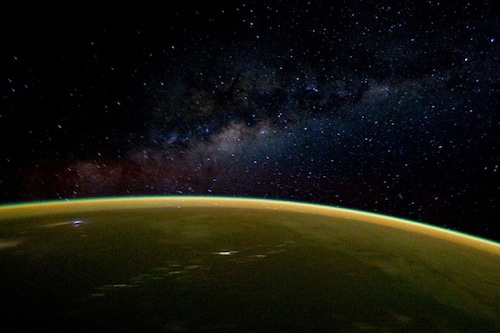 Intelligent Design
Intelligent Design
 Life Sciences
Life Sciences
 Physics, Earth & Space
Physics, Earth & Space
If ETs Were Found, That Might Well Constitute Evidence for Intelligent Design

Physicist and astrobiologist Paul Davies has a sensible op-ed in the New York Times that packs somewhat of a hidden wallop ("Are We Alone in the Universe?"). A wallop, that is, for adherents of the idea that life’s origins are fully explicable by unguided chemical processes.
Dr. Davies pours cold water on the hype about "40 billion habitable planets" in the Milky Way galaxy alone. (The figure keeps going up. See Rob Sheldon’s post of just two weeks ago, "About Those Reported 8.8 Billion Earth-Like Planets.") The problem is that even if those planets are fit for life, that doesn’t tell you whether life has actually booted up on any of them, or whether biology on our planet is the sole "freak" exception to a general rule of lifelessness.
When Davies was a young man, he says, the prevailing assumption was that we are indeed a freak phenomenon, unique in the stars. Now fashion has swung the other way. For no substantive reason, despite the silence from space, the science media abound with assurances that the universe teems with life.
What’s changed is not the evidence — for life elsewhere, there’s still zero — but just scientific mood:
When I was a student in the 1960s, the prevailing view among scientists was that life on Earth was a freak phenomenon, the result of a sequence of chemical accidents so rare that they would be unlikely to have happened twice in the observable universe. "Man at last knows he is alone in the unfeeling immensity of the universe, out of which he has emerged only by chance," wrote the biologist Jacques Monod. Today the pendulum has swung dramatically, and many distinguished scientists claim that life will almost inevitably arise in Earthlike conditions. Yet this decisive shift in view is based on little more than a hunch, rather than an improved understanding of life’s origin.
It’s not impossible that more information about the atmosphere on one or more of those non-Earth earths could tip us off with diagnostic signs of life. What if it did?
While herd opinion currently says that life’s getting itself started is easy, Davies recognizes that the most Earth-like planet we know — Earth — gives evidence so far of only one genesis of life, only one operating system. That can be explained as the result either of common descent or common design. If getting life started on a hospitable planet were indeed a snap, you’d think we would see "alien" life forms, operating systems at variance from our own, right here on Earth.
Davies doesn’t rule it out:
If life does pop up readily in Earthlike conditions, then it should have started many times, right here on our own planet. It could be that intermingled among the seething microbes all around us are some that are so biochemically different they could be descended only from a separate origin. You couldn’t tell by looking, only by delving into their molecular innards and finding something weird enough to rule out a common precursor. The discovery of just a single "alien" microbe under our very noses would be enough to conclude that the universe was indeed teeming with life.
Yet while analyzing the life on our own planet is readily accessible, no such alien microbe has been found. That in turn confirms both common sense and other findings about how devilishly difficult it must be for life to kick-start on its own. Davies writes:
The underlying problem is complexity. Even the simplest bacterium is, at the molecular level, staggeringly complex. Although we have no idea of the minimal complexity of a living organism, it is likely to be very high. It could be that some sort of complexifying principle operates in nature, serving to drive a chaotic mix of chemicals on a fast track to a primitive microbe. If so, no hint of such a principle has been found in laboratory experiments to re-create the basic building blocks of life.
So the evidence "under our very noses" suggests that left to its own devices, in the absence of design, dead matter does not spontaneously give forth life. �Don’t misunderstand — I do not mean to read more into what Davies means to imply than is warranted. He, after all, includes in his article the required faith statement: "Although the pathway from microbes to complex thinking beings like humans may still be a very difficult one, at least we know the mechanism whereby it happens — Darwinian evolution."
He’s not an advocate of intelligent design. But if so far all the data point toward life not spontaneously assembling, powered by the mere warming rays of our sun or another star, then if it were to turn out that the galaxy really does brim with life, wouldn’t that at least be highly suggestive of some intelligence, some designer, having seeded it there?
Of course if life exists on our planet alone, that’s also a problem for materialists. Sometimes it puzzles me that they keep pushing the notion of a widely inhabited cosmos. Whether the idea is true or not, it seems to be, for them, a lose-lose proposition while being for us a win-win.
Photo credit: Milky Way seen over the Earth’s limb, NASA/Astronaut Photograph STS131-E-14516.
